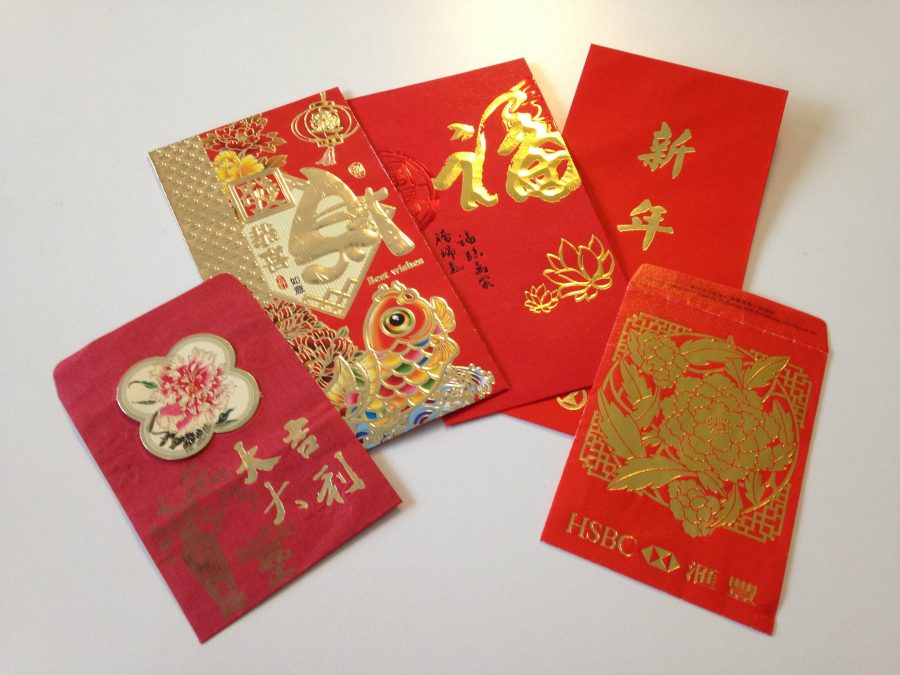Happy New Year~ Lunar New Year!
Children traditionally receive red envelopes on New Year’s, containing various amounts of money.
Typically, New Year’s Day in America is celebrated on January 1, with friends and family, counting down to midnight; however Lunar New Year’s has a mind of its own.
Falling between the end of January and the beginning of February, this year the holiday falls on January 28.
This celebration is commonly known as Chinese New Year; however, it is not just celebrated by not only those in China, but also including Macau, Singapore, Taiwan, Korea, Thailand, Indonesia, the Philippines, and more.
A handful of Adams students also take part in celebrating the New Year, each in his or her own unique way.
Senior Julie Ye describes how she celebrates the holiday.
“We usually have a potluck with our family friends, and we eat dumplings every year. My parents give me a red envelop with money, but that’s not every year. It’s usually every other year because they give me a lot of money,” said Ye.
The red envelopes are a common tradition among the countries that celebrate Lunar New Year, and it acts in lieu of gifts during holidays. Along with the envelopes, Ye talks about another tradition in her household.
“We watch the Chinese New Year showing on CCTV called Chūn Jíe Wǎn Huì,” said Ye.
The show, known as the Spring Festival Gala, is an annual program providing a variety of entertainment, from singing to dancing to comedy and drama performances. According to The Korea Times, the show rakes in over 750 million people annually. With all these traditions, Ye’s favorite part is the red envelopes, joking about the tradition.
“I like getting money,” said Ye.
Following similar traditions to the Chinese, Taiwanese sophomore Jasmine Cheng also celebrates Lunar New Year.
“At Chinese school, we do a Xīn Nián Wǎn Huì [New Year performance], and then after, my parents usually have people over and we eat hot pot, and [my parents] give out red envelopes,” said Cheng.
Like Chinese traditions, the celebration is spent with friends and family, also honoring the tradition of the red envelopes.
“All the parents line up, and then we [the kids] have to say a phrase [a greeting or of good fortunes] to them, and each one has to be different…If you say it right, they’ll give you money,” said Cheng.
In Asian cultures, it is highly important to respect those who are older; in this case, it’s the parents. The phrases said to parents are best described as wishes one hopes for their parents, such as good health, or a great year. The best part, according to Cheng, is the overall celebration.
“[My favorite part is] Hanging out with friends, and the festivities of it,” said Cheng.
In addition, the Korean customs are similar to those of Chinese and Taiwanese ways of celebrating. Senior Limmy Kim shines a light on the Korean traditions she takes place in.
“We eat rice cakes… some families give money, but our family doesn’t,” said Kim.
Rice cakes are a traditional food eaten around the new year, not only in Korean culture, but in several other Asian cultures as well. Not only is it traditional to eat, those who celebrate it also have the practice of creating the dishes.
“My favorite part is the food, in particular, making the food together,” said Kim.
Kim also describes some of the customs.
“[in general]… you have to go and bow to the oldest people in your family and they give you money,” said Kim.
Following the pattern of respect, Koreans also have high regards of their elders. Like the Chinese and Taiwanese, money is also given.
Lunar New Year is a highly respected and celebrated holiday in East Asia. Though it may not be as prevalent here at Adams, it is still an important part of Eastern Asian traditions.






